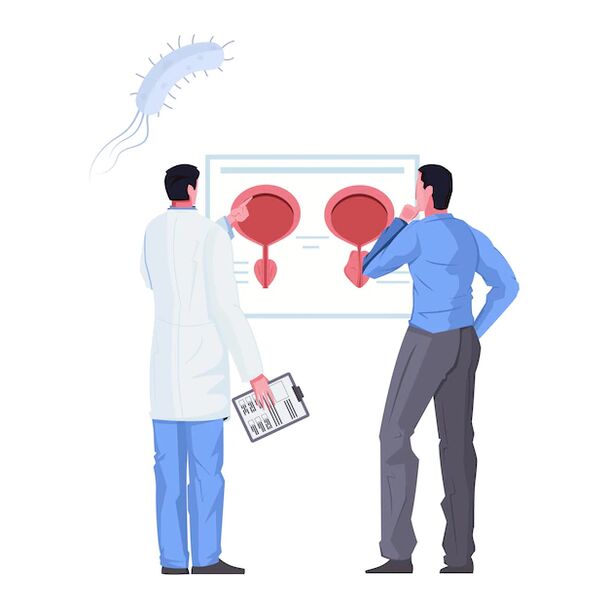
Cystitis is a disease accompanied by damage to the mucous membrane and walls of the bladder. This disease leads to a gradual alteration of the functions of the organ. According to statistics, women are more susceptible to this pathology than male patients. According to official data, cystitis is diagnosed in 0. 8% of men who have passed the age of forty.
The relatively low prevalence of cystitis in male patients is due to the structural characteristics of the urethra. In men it is longer than in women. Therefore, it is much more difficult for the infection to enter the bladder.
In most cases, pathology develops against the background of bladder outlet obstruction. This is a subvesical compression of the bladder, which becomes an obstacle to the free passage of urine.
Causes of cystitis
To reduce the risk of cystitis in men under 40 years of age, it is necessary to carefully follow the rules of intimate hygiene. After reaching this age, the urinary system of the stronger sex is more susceptible to the development of various pathologies that can lead to damage to the walls and mucous membranes of the bladder.
Cystitis in men is a consequence of the inflammatory process in the area of the prostate, testicles and urethra. There are other causes of this disease:
Urological problems that cause retention of urine in the body (urethra that is too narrow).
Prostate adenoma.
Diverticular disease.
Infectious diseases that are transmitted through intimacy. These include gonorrhea and chlamydia.
Prostatitis, inflammation of the urethra, vesiculitis. The listed diseases can cause pathological changes in the functioning of the bladder.
The presence of a mechanical barrier (in particular, stone formation).
He performed urological surgery in the recent past.
Malignant neoplasm in the urethra or prostate.
Infections located in the upper respiratory tract. If a patient falls ill with ARVI or tonsillitis, bacteria can penetrate through the systemic bloodstream to the organs of the genitourinary system. Therefore, cystitis can be a consequence of any infection (regardless of its location).

In some cases, the disease develops due to pyelonephritis or renal tuberculosis. The latter usually occurs without pronounced symptoms and is accompanied by fatigue, weakness and a slight increase in body temperature.
About 90% of the world's inhabitants are carriers of the infection. Many people have reduced immunity due to frequent alcohol consumption, prolonged stress, consumption of unhealthy foods, and prolonged smoking. Due to the above factors, a transition from the latent phase of bacterial activity to the active phase occurs. As a result, damage occurs not only to the lungs, but also to other organs:
prostate;
testicles;
kidney
In some situations, when culturing with Koch bacillus, a false negative result is obtained. An infectious disease disguises itself as another (no less serious) pathology. This leads to the failure to prescribe appropriate treatment in time.
There are other factors that provoke a decrease in immunity: increased blood sugar, hypothermia, chronic lack of sleep, spinal injuries.
Signs of cystitis in men
In the acute phase of the disease, the man needs to empty the bladder frequently. In this case, when visiting the toilet, a very small amount of urine may be released.
Sharp pain may occur when emptying the bladder. As a rule, pain appears at the beginning and end of urination. Your expression may vary. Pain sensations can be tolerable or intense. In the intervals between visits to the bathroom, men experience discomfort in the penis, pubic area and groin.
With cystitis, body temperature often rises. General signs of poisoning may appear. The man feels a constant lack of strength and complains of headaches. If such symptoms appear, treatment in a hospital is recommended.
Sometimes the disease is severe and gangrenous and hemorrhagic cystitis may occur. The urine produced is cloudy. Mucous or bloody inclusions can be seen and it has a putrid, unpleasant odor. At the same time, the amount of fluid secreted by the body throughout the day is reduced to 0. 3 liters.
As the disease becomes chronic, the pain becomes less intense. There are no longer bloody impurities in the urine, but it may still contain mucous inclusions. In addition, the transition from chronic cystitis to the acute phase is possible at any time.
The causes of the disease can be:
non-infectious;
infectious.
There are several forms of bladder infection:
Growing.In this case, the infection penetrates from the external environment into the bladder.
Falling.The infection enters the bladder from other organs (particularly the kidneys).
Lymphogenic.In this case, infection of the bladder through the lymphatic vessels is observed.
Hematogenous.If there is a purulent focus in the body, the infection can spread from this problem area through the bloodstream. It later enters the bladder.
It is worth mentioning the non-infectious causes of pathology:
an allergic reaction leading to an inflammatory process in the mucous membrane of the bladder;
deterioration of the functions of the nervous or immune system;
chemical burn - due to the error of the medical worker, the patient may be given the wrong medication prescribed by the doctor;
attend radiotherapy sessions that involve exposure to the pubic area.
Diagnosis of the disease.
If you detect at least some symptoms of cystitis, you should not postpone a visit to the urologist. After a thorough examination, the specialist will prescribe comprehensive treatment.
To establish an accurate diagnosis, a man is recommended to undergo the following diagnostic procedures:
Urogenital smear.This procedure is intended to diagnose hidden infections that are transmitted through sexual intercourse.
Bacterial culture.This analysis is necessary to establish the type of pathogen and determine its sensitivity to certain medications.
Performing a general urine analysis.In the presence of inflammation, a higher content of red blood cells and white blood cells will be detected. An acidic reaction in the urine indicates the presence of a tuberculous infection in the body.
Performing cystoscopy.An informative diagnostic procedure can be carried out only in the absence of an acute phase of the disease. When performing cystoscopy, stones, tumors and other foreign bodies can be detected. If necessary, biomaterial is collected for additional diagnostic procedures.
If you experience constant urinary retention and severe acute pain, you should be careful when using pain relievers. In this case, the representative of the stronger sex needs urgent hospitalization.
Basic recommendations for the treatment of cystitis.
During the treatment of the disease, patients should follow the recommendations listed below:
Maintain bed rest.At elevated temperatures, antipyretic medications are indicated. It is also necessary to remember the correct drinking regimen. In addition, patients should temporarily exclude sour and smoked foods from the diet and follow a strict diet. When preparing food, it is advisable to use a minimum of spices and seasonings.
Use of herbal medicines.Doctors often prescribe herbal infusions that have antibacterial and diuretic effects. These products contain natural ingredients (horsetail, bearberry). To reduce the intense inflammatory process, preparations based on medicinal herbs are used. To strengthen the immune system, drink fruit juice made from cranberries. When using herbal remedies, it is impossible to achieve a quick effect. These products require prolonged use. Herbal medicines are not considered essential. They are used only as part of a complex treatment of cystitis.
Performing PCR diagnoses.It is necessary to detect viruses that are sexually transmitted. The treatment regimen is selected by the doctor (taking into account the type of pathogen).
Medications with analgesic properties.To eliminate pain, it is recommended to prescribe antispasmodics. In some situations, the prescription of non-steroidal anti-inflammatory drugs is indicated.
Take medications with a pronounced antibacterial effect.Such drugs are prescribed after determining the sensitivity of the pathogen to the prescribed drugs. In the treatment of cystitis, cephalosporins and fluoroquinolones are actively used. These medications are used only after consulting with a doctor. However, the duration of its use should not exceed 1 week.
Helps with an attack of acute cystitis.
To alleviate the patient's condition in the acute phase of cystitis, it is recommended to drink large amounts of fluid. Activates the elimination of pathogenic microorganisms. Consequently, the patient's well-being will gradually improve.
In advanced forms of the disease, the best option is to take antispasmodics. These medications help reduce the tone of the smooth muscles located in the bladder area. Analgesics are used to relieve pain.
Taking antibiotics without a prescription from a urologist is strictly prohibited. It can lead to distortion of the results of diagnostic studies. As a result, it will be much more difficult to identify the cause of the disease. If you try to undergo treatment without consulting a doctor, you will only be able to temporarily eliminate the main symptoms of the pathology. In addition, there is a high risk of cystitis becoming chronic.
Existing risk factors
The risk of cystitis in men increases:
with irregular emptying of the bladder;
vitamin deficiency;
maintain a sedentary lifestyle;
unprotected sexual relations;
frequent change of sexual partners;
prolonged overwork;
the presence of a foreign body in the bladder area;
wearing uncomfortable underwear;
the presence of chronic diseases of the male genital organs;
decreased immunity.
Complications of the disease.
You should not try to treat cystitis on your own. In the absence of adequate therapy, the following consequences may occur:
Changes in the structure of the bladder.Against the background of epithelial degeneration, this organ gradually loses its elasticity and noticeably decreases in size. A consequence of cystitis is also the loss of the ability to regenerate tissue. This can cause a bladder rupture.
Kidney damage.The most common complication of untreated cystitis is pyelonephritis. An even more serious consequence is the development of kidney failure. This occurs against the background of severe intoxication of kidney tissue by waste products of pathogenic microorganisms.
Weakening of the bladder sphincter, causing urinary incontinence.This complication is diagnosed more frequently in elderly patients.
Depression in the context of an illness that becomes chronic.Recurrences of cystitis can occur several times a month. At this time, the man becomes a "hostage of the toilet", his psychological state deteriorates significantly.
Note!In the absence of adequate treatment, the risk of the disease becoming chronic is quite high. In this case, damage is observed to both the bladder and other organs of the genitourinary system.
How to avoid developing the disease?
To minimize the risk of developing the disease, it is necessary to follow these recommendations:
Wash yourself at least once a day. In this case, it is advisable to use a simple baby soap that does not contain dyes or other harmful synthetic components.
Give preference to clothing appropriate to the climate. Against the background of hypothermia, not only cystitis can develop, but also more serious pathologies that cause infertility.
It is good for both partners to wash with soap before and after sexual contact.
Use condoms during intimacy.
Take care of increasing your own immunity. This is especially true if a representative of the stronger sex is susceptible to frequent ARVI. If the functions of the immune system are affected, an immunologist should be consulted.
Do not try to hold back urination. With prolonged urinary retention, a rapid development of infection in the bladder is possible.
Change your underwear daily.
Drink enough fluids.
Avoid wearing underwear made of synthetic fabrics.
After defecating, wash from front to back. Otherwise, the bacteria will be transferred from the intestines to the external male genitalia. From there, pathogenic microorganisms easily penetrate the urethra and then the bladder.
Follow the recommendations to prevent constipation.
Do not take medications without a doctor's prescription.
During an acute attack of cystitis, it is recommended to drink about 2 liters of fluid per day. Berry or fruit juices, currant juice and still drinking water are ideal for this. It is recommended to forget for a while about drinking drinks containing alcohol and soft drinks.
Osteopathic techniques are sometimes used in the treatment of cystitis. This speeds up the patient's recovery process.
If indicated, the use of acupuncture methods is indicated. They involve influencing special biological points. This technique has a minimum number of contraindications and side effects.
























